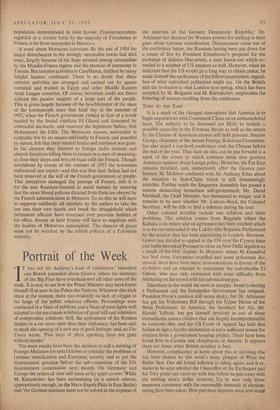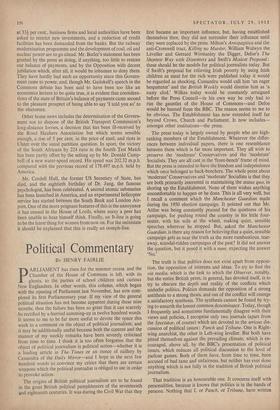Portrait of the Week
I
4 T was not Sir Anthony's kind of conferqnce: remarked one British journalist about Geneva, where the meetings of the Big Four have overshadowed all other news of the week. It is easy to see how the Prime Minister may have found himself ill at ease in the Palais des Nations. Whatever else took plate at the summit, there was evidently no lack of oxygen in the lungs of the public relations officers. Proceedings were conducted in a blare of publicity and a blaze of neon lights well adapted to the maximum exhibition of good will and inhibition of compromise solutions. Still, the appearance of the Russian leaders in a car more open than their diplomacy has been said to mark the opening of a new era of good feelings; and, as The. Times wrote, 'Five days of plain speaking haye not gone without results.' of the Big Four have overshadowed all other news of the week. It is easy to see how the Prime Minister may have found himself ill at ease in the Palais des Nations. Whatever else took plate at the summit, there was evidently no lack of oxygen in the lungs of the public relations officers. Proceedings were conducted in a blare of publicity and a blaze of neon lights well adapted to the maximum exhibition of good will and inhibition of compromise solutions. Still, the appearance of the Russian leaders in a car more open than their diplomacy has been said to mark the opening of a new era of good feelings; and, as The. Times wrote, 'Five days of plain speaking haye not gone without results.'
The main results have been the decision to call a meeting of Foreign Ministers for next October to consider the problems of German reunification and European security and to put the disarmament question before the sub-committee of the UN disarmament commission next month. On Germany and Europe the points of view still seem as far apart as ever. While M. Khrushchev has been maintaining (in a speech uttered, appropriately enough, on the Marx-Engels Platz in East Berlin) that 'the German question must not be solved at the expense of the interests of the German Democratic Republic,' Dr. Adenauer has thanked the Western powers for sticking to their guns about German reunification. Disarmament came out of the conference better, the Russians having been put down for a count of five by President Eisenhower's proposal for the exchange of defence blue-prints, a near knock-out which ex- tended to a number of US senators as well. However, when he indicated that the US would go a long way to obtain peace, he made himself the spokesman of his fellow-countrymen, regard- less of what individual politicians might say. On the British side the invitation to visit London next spring, which has been accepted by M. Bulganin and M. Khrushchev, emphasises the lowering of tension resulting from the conference.
TURN TO THE EAST It is a mark of the changed atmosphere that America is to begin negotiations with Communist China on an ambassadorial level. The subjects to be discussed are likely to include a possible cease-lire in the Formosa Straits as well as the return by the Chinese of American airmen still held prisoner. Senator George, chairman of the Senate Foreign Relations Committee. has also urged a top-level conference with the Chinese before the end of the year. That such an idea can be put forward is a mark of the extent to which common sense now governs American opinion about foreign policy. However, the Far East remains troubled, and, immediately after the Geneva con- ference, M. Molotov conferred with Sir Anthony Eden about the situation in Indo-China which is still threateningly anarchic. Farther south the Singapore Assembly has passed a motion demanding immediate self-government; Mr. David Marshall, the Chief Minister, has threatened to resign; and it remains to be seen whether Mr. Lennox-Boyd, the Colonial Secretary, will be able to find a solution during his tour.
Other colonial troubles include one solution and three problems. The solution comes from Buganda where the Kabaka is to return and an agreement has been reached which is to be recommended to the Lukiko (the Buganda Parliament) by the mission that has been negotiating in London. However, Greece has decided to appeal to the UN over the Cyprus issue and India has asked Portugal to close its New Delhi legation as a result of the Goa dispute. In Morocco, where M. Grandval has had some Europeans expelled and some policemen dis- missed, there have been more demonstrations in favour of the ex-Sultan and an attempt to assassinate the redoubtable El Glaoui, who was only restrained with some difficulty from retaliating on the crowd with his sub-machine gun.
Elsewhere in the world the news is scrappy. Israel is electing a Parliament and the Indonesian Government has resigned. President Peron's position still seems shaky, but Dr. Adenauer has got his Volunteers Bill through the Upper House of the Bonn Parliament. In America, the Secretary for Air, Mr. Harold Talbott, has got himself involved in one of those transatlantic causes celebres that are largely incomprehensible to everyone else, and the US Court of Appeal has held that failure to sign a loyalty declaration is not a sufficient reason for eviction from a government housing project. There have been forest fires in Canada and cloudbursts in Austria. It appears there are times when British weather is best.
However, complacency at home about this or anything else has been shaken by this week's nasty glimpse of What the Butler Saw. Our old friend inflation is riding again, and it re- mains to be seen whether the Chancellor of the Exchequer and his Tory posse can catch up with him before he gets away with the sterling area's dollar reserves. Up to now only those measures consonant with the reasonable demands of election- eering have been taken. Hire-purchase deposits must now stand at 33} per cent., business firms and local authorities have been asked to restrict new investments, and a reduction of credit facilities has been demanded from the banks. But the railway modernisation programme and the development of coal, oil and nuclear power are to go ahead. Mr. Butler's statement has been greeted by the press as doing, if anything, too little to restore our balance of payments, and by the Opposition with decent jubilation which, after all, it would be inhuman to deny them. They have hardly had such an opportunity since this Govern- ment came to power, and, though Mr. Gaitskell's speech in the Commons debate has been said to have been too like an economics lecture to be quite true, it is evident that considera- tions of the state of Britain's balance of payments came second to the pleasant prospect of being able to say 'I told you so' to the electorate.
Other home news includes the determination of the Govern- ment not to dispose of the British Transport Commission's long-distance lorries, a decision that has been ill-received by the Road Hauliers Association but which seems sensible enough, a rise of 5 per cent. in the price of steel, and riots in Ulster over the usual partition question. In sport, the victory of the South Africans by 224 runs in the fourth Test Match has been partly offset by the setting up by Mr. Donald Camp- bell of a new water-speed record. His speed was 202.32 m.p.h. compared with the previous record of 178.497 m.p.h. held by America.
Mr. Cordell Hull, the former US Secretary of State, has died, and the eightieth birthday of Dr. Jung, the famous psychologist, has been celebrated. A second atomic submarine has been launched in America, and an experimental helicopter service has started between the South Bank and London Air- port. One of the more poignant features of this is the annoyance it has caused in the House of Lords, where many a peer has been unable to hear himself think. Finally, an It-line is going to be the latest thing for women from now on. For the uninitiate it should be explained that this is really an oomph-line.



































 Previous page
Previous page